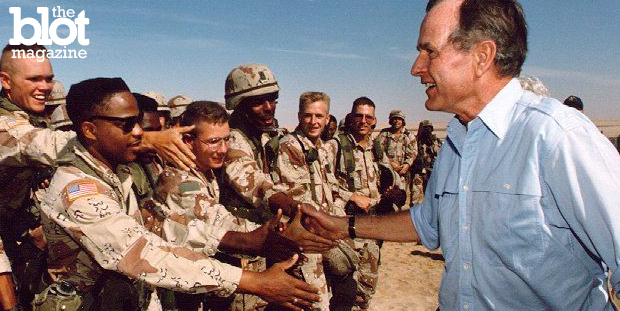
Aug. 2, 1990 was a historic date like no other. It was the day Kuwait was invaded by Iraqi forces led by Saddam Hussein, a move that sent shockwaves around the world not because of the move itself — tensions had been building in the area for sometime, and it was only a matter of time before someone was invaded/bombed/politically roughed up — but due to the sheer size and scope from which Iraqi forces were making it happen.
As soon as news of the invasion that led to the Gulf War broke, the U.S. war generals began grumbling (how dare an invasion happen without them knowing!), shaking their medals and constructing plans on how best to handle the situation through a show of force. Not necessarily because it was the right thing to do, but because Iraqi forces were dangerously close to the sweet, sweet oil fields of Saudi Arabia and were posed to keep invading until they swept into Saudi Arabia to claim the fields as their own, something not the U.S. — and the world — could not let happen.
Had that particular western hemisphere nightmare been allowed to take place, it would have meant that Saddam Hussein would have had control the majority of the world’s oil fields, meaning most of the world, along with the Organization of the Petroleum Exporting Countries (OPEC), would be BFFs with Saddam for life. The reasons the U.S. government gave publicly for getting involved in the Kuwaiti war ranged from blaming bad intelligence regarding the build up of hostile Iraqi forces on the Kuwait border to horrific testimonies cast before members of Congress by witnesses who claimed they saw Iraqi soldiers committing crimes against children, even babies still in incubators. Shocking, horrific and completely fabricated.
When the invasion of Kuwait began, a group in the U.S. called “Citizens For a Free Kuwait” hired a PR company called Hill+Knowlton to help foster sympathy for Kuwait by giving out literature, arranging pro-Kuwait speakers talk on college campuses and even arranged a meeting with members of Congress and a nurse who was working in Kuwait so they could hear in detail about the war crimes being committed by the Iraqi forces. The PR company was paid $11 million by the Kuwait government to accomplish all of this, and the “nurse” who testified before members of Congress wasn’t actually a nurse, but a member of the Kuwaiti ambassador to the United States (none of these revelations came to light until we had already begun the war). It was all a lie that worked well, and soon the U.S. had approval from Saudi Arabia to begin a build up of U.S. and coalition forces near the border, a build up that nearly matched the number of U.S. troops deployed to Vietnam.
Read more: Want to Honor Veterans Year-Round? Give Them a Job
Once there, a total of 34 countries had joined the U.S.-led coalition mission, either through direct supply of troops or backing the war financially. When it was all said and done, in less than two months, Iraqi forces were repelled from the region, and Kuwait was back to its original state of not being invaded. But in the 25 years after the invasion, when we look back at what took place and how the Gulf War really began on the preface of a lie and how many soldiers from that era are still sick and fighting the illnesses without a cure and even less hope, there are a lot of questions that still linger with no viable answers to be found.
If the war was so noble, why was there such deceit to get us involved in the first place? Saddam Hussein was allowed to simply go back home like a kid who got expelled from school, even though he started the Gulf War in the first place. Not only that, but upon his return to Iraq, he slaughtered thousands of Kurdish rebels who had started an uprising against his regime, who were also encouraged by our government to do so, upon the promise of assistance from the U.S. The U.S. government never came through, and the rebellion was easily quelled by Iraqi military forces. Saddam wasn’t completely dealt with by the world’s governing powers until 2003 after they had all, apparently, had enough of his shenanigans. The civil rights violations and atrocities Hussein was accused of, and subsequently hanged for, had been committed in 1982 following a failed assassination attempt on his life, well before the Gulf War was even a thought.
So while the war was nearly paid for entirely by the world, rather than U.S. taxpayers and coalition/U.S. casualties were minimal and the timeframe was brief, it was still a war where, once again, nothing was as it seemed until years later. So before you reflect back on where you were and what you were doing when news broke of the first airstrike, remember that first and foremost, good men and women died at the hands of a lie — again.
The best way to commemorate the 25th anniversary of the war that waged until Feb. 28, 1991 is to support local and federal politicians who know the cost of war and want to bring our servicemen and women home where they belong. Or get involved in politics yourself and step up the eco-game. Support green initiatives that can help us break our dependence on oil so we don’t have to keep repeating the same Middle East war cycle we seem so addicted to. War will happen, but bear in mind that we now have generation of children that have never seen the U.S. not at war — and this needs to end.
Diana Marsh is a contributing journalist for TheBlot Magazine.





